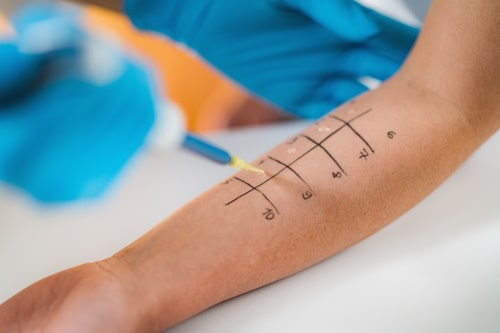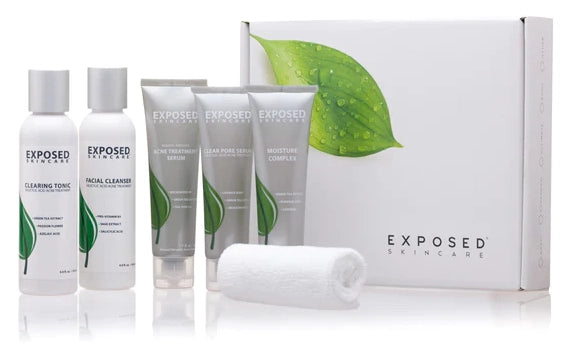Allergic reactions can sometimes manifest in various ways, including allergic reaction acne. These are not your typical acne breakouts; they are complex skin conditions that involve a different level of irritation and care.
This extensive guide aims to shed light on allergic reaction acne, dissecting its causes, treatments, and how it differentiates itself from common acne. Continue reading to get that clear and smooth skin you have always wanted.
Also read: How to choose the best acne treatment
Biggest Take-Aways:
- Allergic reaction acne is a unique skin condition triggered by allergens and involves an immune response.
- Identifying the allergens and avoiding them is key to managing this condition effectively.
- Multiple topical treatment options are available, focusing on reducing redness, itchiness, and inflammation.
- Exposed Skin Care offers a comprehensive solution for managing common skin issues like allergic reaction acne, acting as a helpful tool in your broader skincare strategy.

What Is Allergic Reaction Acne?
Before diving into the details, let's establish what allergic reaction acne is. Unlike typical acne, which is caused primarily by clogged hair follicles and increased sebum production, allergic reaction acne is a manifestation of your body's defense mechanisms against allergens.
It is a blend of allergy symptoms and acne-like bumps on the face and body. These reactions can occur due to various allergens and might involve symptoms of allergic contact dermatitis or irritant contact dermatitis.
The Appearance
Allergic reaction acne may exhibit various signs and symptoms that make it distinct:
- Small red bumps: Tiny, itchy bumps on the skin are commonly seen.
- Redness and Inflammation: General redness usually accompanies these bumps.
- Itchy: A high level of itchiness is generally present.
- Pus and Crust: These bumps can sometimes contain pus and may develop a crust over time.
Common Causes of Allergic Reaction Acne
The etiology of allergic reaction acne is diverse and might involve coming into contact with an irritant, consuming certain foods, or exposure to airborne allergens.
Contact with An Allergen
The skin is our first line of defense, but it can be quite vulnerable to irritants and allergens. Cosmetics, sprays, or topical creams may cause allergic reactions that look like pimples or acne.
Food Allergies
Food allergies are another significant player. Allergies to foods like dairy, peanuts, or shellfish may cause acne-like symptoms, including small red bumps that may inflame the skin.

Seasonal Allergies
When the seasons change, so does the air, bringing a new set of allergens. Seasonal allergies may cause breakouts that look like acne but are actually your body's reaction to pollen or other airborne substances.
Dermatitis and Other Skin Conditions
Skin conditions like dermatitis, rosacea, or milia can also cause allergic reactions. These reactions can look like acne and may develop into more severe forms if not managed properly.
Symptoms: How To Identify Allergic Reaction Acne?
Knowing how to differentiate between allergic reaction acne and common acne is crucial for selecting the right treatment options. Symptoms of an allergic reaction may include:
- Itchiness: Unlike regular acne, these bumps are typically very itchy.
- Redness and Inflammation: Noticeable redness and inflammation are usually present.
- Bumps on the face: Bumps that look like pimples or cysts might appear.
- Around the Eyes: Allergic reaction acne can also occur around the sensitive eye area.
- Welts and Hives: In rare cases, welts or hives may develop as an allergic reaction.
Treatment Options for Allergic Reaction Acne
Treatment for allergic reaction acne will differ significantly from standard acne treatments, primarily because the underlying causes are not the same. A targeted approach is required to alleviate both the allergy symptoms and the acne-like lesions.
Moisturizers and Creams
Moisturizers can help soothe the skin, but make sure to choose a moisturizer that doesn't exacerbate the condition. Ointments and creams may provide temporary relief but are not a permanent solution.
Allergy Tests
An allergy test can help identify the possible causes of your allergic reaction to acne. Once you know what to avoid, it becomes easier to manage the condition.

Topical Treatments
There are specific creams designed to treat both acne and allergic reactions. Look for products that promise to reduce redness, irritation, and itchiness.
Avoid Products with Known Allergens
If you know what triggers your allergic reactions, avoid products containing those allergens. This is often the most effective way to prevent an outbreak.
Oral Medications
In some severe cases, oral medications may be prescribed to control both allergies and acne. However, these should be used as a last resort and only temporarily.
Is It Allergic Reaction Acne or Another Skin Condition?
The skin can be quite deceptive. Sometimes, what you think is allergic reaction acne may actually be another skin condition. Conditions like keratosis pilaris, where hair follicles become clogged with dead skin cells, or milia, which are harmless but look like tiny bumps, can be mistaken for allergic reaction acne.
- Rosacea: Rosacea is a skin condition that causes redness and visible blood vessels on the face. It can sometimes be mistaken for allergic reaction acne due to its similar appearance.
- Irritant Contact Dermatitis: This condition occurs when the skin comes into contact with an irritant. It can cause a rash that looks like acne, including red bumps that may develop a crust.
- Milia Are Harmless: Milia are tiny, hard bumps that usually go away on their own. They are often mistaken for allergic reaction acne but are generally benign.
Benefits of Using Exposed Skin Care for Managing Acne
Managing acne requires a strategic approach that targets various factors that cause acne. Exposed Skin Care offers a comprehensive line of products that can be a game-changer in your fight against common skin problems.
Here are some benefits:
- Combat Multiple Causes: Whether your acne is due to exposure to allergens or clogged pores, Exposed Skin Care products aim to fight off multiple factors effectively.
- Prevents Infection: Acne bumps can often become infected if not treated appropriately. The Treatment Serum in the basic kit is designed to manage this issue.
- Soothes Skin: The Moisture Complex hydrates without clogging pores, reducing the likelihood of developing a rash or blisters.
- Reduces Keratin Build-Up: The Microderm Scrub clears pores and exfoliates, helping to eliminate excess keratin that may cause small bumps.
- Minimizes Scratching: The itchiness and discomfort often due to scratching are alleviated, preventing the acne from becoming a severe reaction like a pustule or blister.
- All-Around Care: The range of products targets multiple areas where acne might start to develop. Concerns on the face include the T-zone and sensitive areas prone to redness and inflammation.
Exposed Skin Care tries to fight off the acne before it becomes a more significant, providing an all-around solution for your skin.
Conclusion
Navigating the complex landscape of allergic reaction acne can be overwhelming, but it's important to remember that understanding the nuances of this skin condition is the first crucial step toward managing it effectively.
By being aware of what causes your allergic reactions and the symptoms you should look for, you'll be better prepared to manage flare-ups when they happen. It's about taking control and actively participating in your skincare journey with the right knowledge and resources.
Exposed Skin Care offers a comprehensive solution for managing common skin concerns, including those pesky skin bumps. It's a helpful tool in your skincare arsenal but should be part of a broader strategy that includes understanding your triggers, symptoms, and how your body reacts to different treatments.
The goal is to treat your skin like the unique organ it is, with its own set of needs and reactions. So, while allergic reaction acne can be a tough challenge, you can manage it effectively and enjoy healthier, clearer skin with the right approach.
FAQs
What is allergic reaction acne?
Allergic reaction acne is a type of skin condition that occurs when your skin reacts to allergens. It manifests as red, itchy bumps that resemble traditional acne but are caused by an allergic reaction.
How is it different from regular acne?
Clogged pores, bacteria, or hormone imbalances often cause regular acne. Allergic reaction acne is specifically triggered by an allergen and involves an immune response.
What are common allergens that cause this skin condition?
Common allergens include certain foods, fragrances, plants, and even seasonal factors like pollen.
How can you manage allergic reaction acne?
Avoiding known allergens and using gentle, hypoallergenic skincare products can help manage symptoms. Topical treatments may also relieve redness and itchiness.
Can Exposed Skin Care products help in managing allergic reaction acne?
Yes, Exposed Skin Care offers a range of products formulated to combat various skin issues, including allergic reaction acne. They aim to prevent infection, soothe the skin, and offer care.



















